
OOR STORE X GASM, OR? – the ravewear label you need to know right now
Take the vibe of a techno club at 4 am, a touch of 90s nostalgia and humor, paired with a…
Images courtesy of GASM, OR? Words by Antonia Mittmann and Ann-Kathrin Riedl
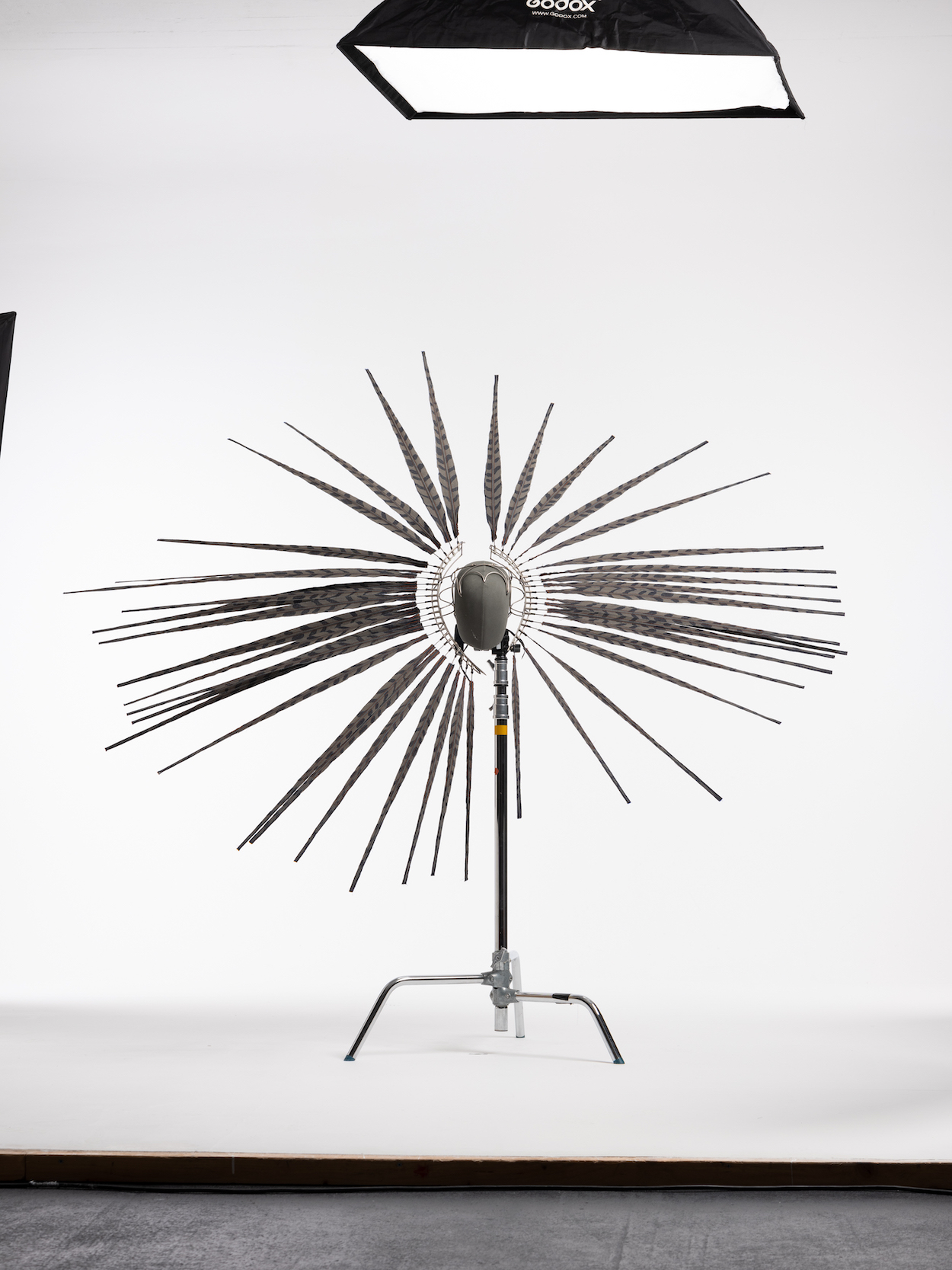

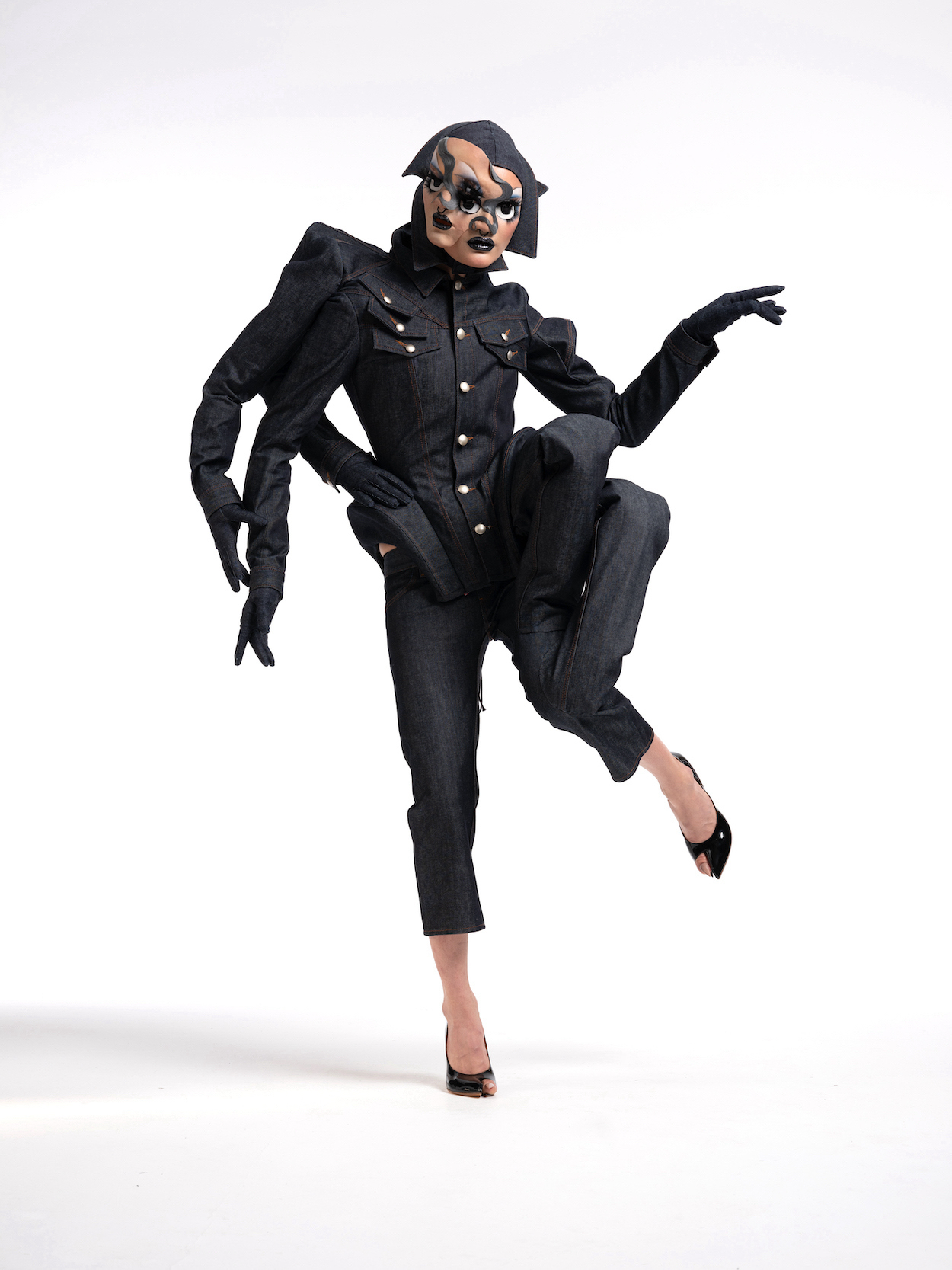
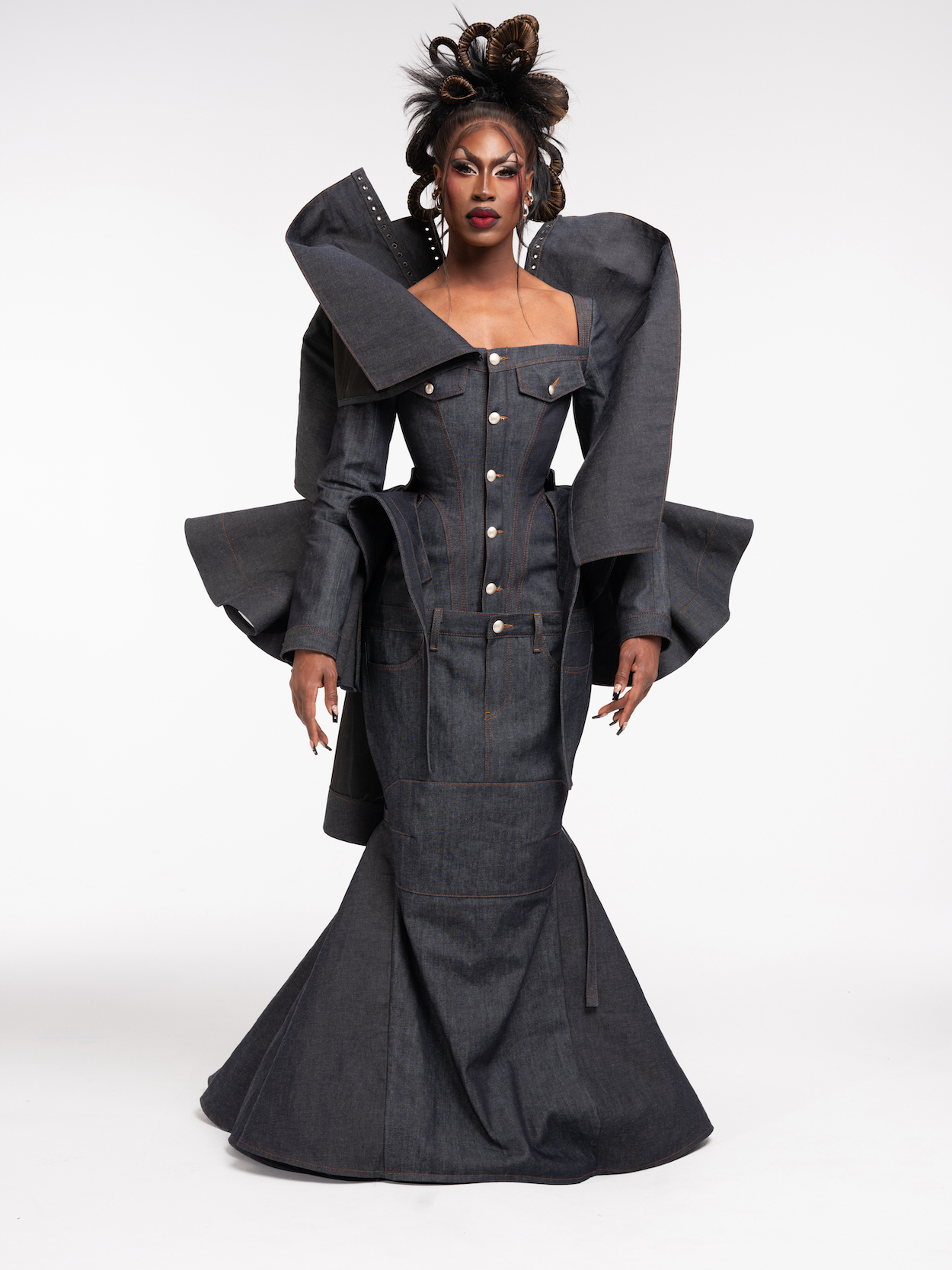
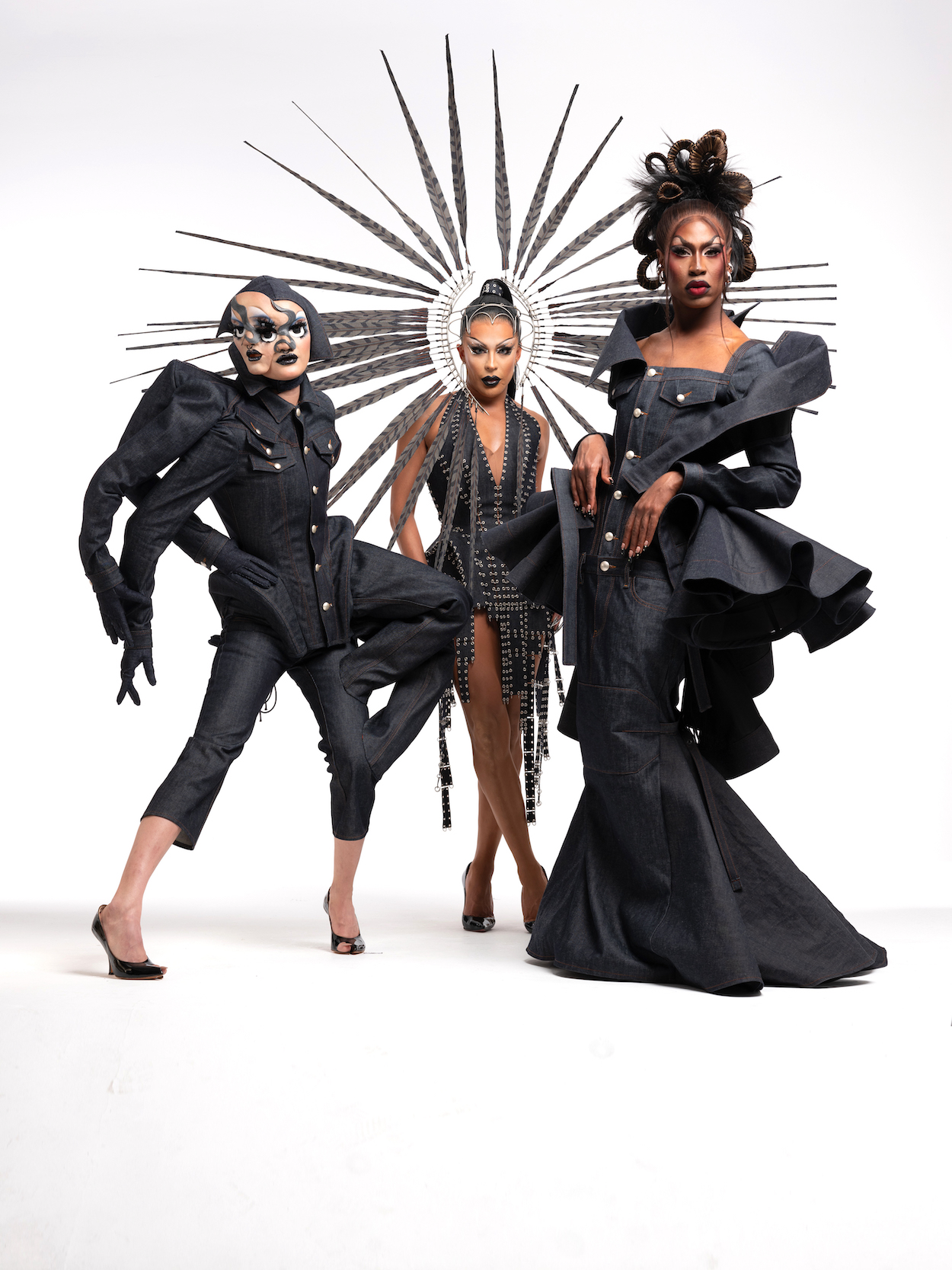
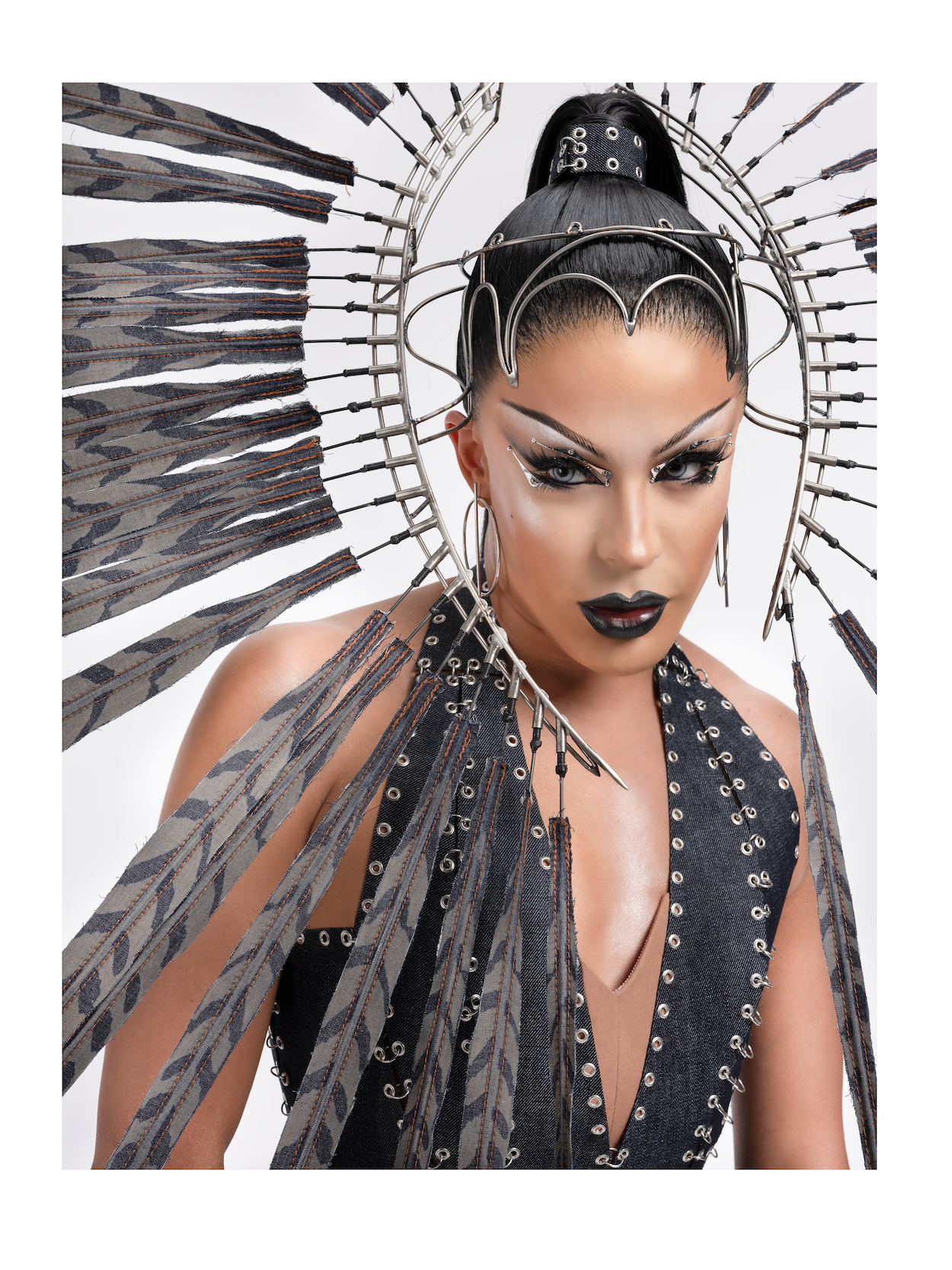
”I’m in heaven: Sitting with three drag queens in the makeup room of a photo studio in Berlin Neukölln, discussing corsetry and tennis strategies, Marlene Dietrich and London club kids, John Galliano’s ups and downs and legacy. We gathered here because Envy Peru from Amsterdam, Hungry from Berlin and Shea Couleé from Chicago were invited by Dutch denim brand G-Star for a very special project. These three queens are bringing the drama to denim. The project is part of G-Star’s Art of Raw initiative, in which denim is interpreted in unexpected and innovative ways. They joined forces with Amsterdam-based design studioTheNightmare Disorder, run by Benji Nijenhuis and Nemo Cheminée, two former fashion students who discovered that their idea of boundary-free storytelling has little or no place in the current luxury market and rather specialize in working with and for drag queens. Benji also works in the technical development department of G-Star so he knew the material –and the challenges that the dragification of denim would present: “At TheNightmare Disorder, we like to put contradictory things together –we like that friction.”Benji and Nemo designed, developed and made each costume in collaboration with the queens, using the G-Star DNA and RAW denims. When we met, they had just finished a fashion movie with Berlin-based (Dutch) filmmaker Anna van der Velde and want to explore that territory further. Their ultimate goal would be to collaborate with Tim Burton because they love his “world building and character building.” Judging by the skill and imagination behind the G-Star drag project, there seems to be no reason why the creator of Charlie and the Chocolate Factory and Edward Scissor hands would not pick up their call. Here is what the three queens had to say about this fairytale project they collaborated on.
Drag is pain – Envy Peru from Amsterdam
Envy: Fine. They are quite soft.
Envy: We talked about first ideas in November 2023.
Envy: I am from the Netherlands; G-Star is a very popular brand here. At first, I could not believe it. Is this for real? I am a big fan of G-Star and now you have us three queens doing something with denim that has never been done before – I think that is very groundbreaking.
Envy: From start to end. We had 12 sketches. It was a collaboration between the artist, the designers and G-Star. Every single detail was discussed.
Envy: Not so much. Denim is a hard fabric to master. I just did a TV Show in Holland where I was wearing a denim look, but this is the first couture piece.
Envy: We wanted this enormoushead piece. So, we created pheasant feathers made of denim.
Shea[interrupting]: The feathers are made of denim?
Envy: They are laser printed and cut so the fabric would look like feathers.
No, not at all. I just love how brands use techniques for innovation. The same way that Fendi treats fur in innovative ways.
Envy: Yes. But drag is pain. But, you know, if you wear something uncomfortable, when it is special, you don’t feel the pain anymore. It’s worth it.
Envy: Yeah. (laughs)
Envy: Anything. A fashion girl, a showgirl. I am an all-rounder as a drag artist. A chameleon.
Envy: I was five years old when my mom, my auntie and I moved from Trujillo in Peru to the Netherlands.
Envy: It started with two things. A friend of mine wanted to call her daughter Envy and I just liked the name. And a lot of people think of Peruvians as small, little people from the mountains. I wanted to show that we can also be glamorous and great.
Envy: We don’t have a lot of representation in the Netherlands. Plus, I found out I was gay. And then I started doing drag. So, I have been different all my life. But I don’t want to be like everybody else.
Envy: Absolutely.
Envy: Yeah. Different. You made a choice to wear…, hm…, this. [points at my caramel Stüssy cardigan] You wanted to be comfortable, I guess.
Envy: You went for lazy drag…(laughs)
Clothing is a language. Your drag today is communicating utilitarian approach. What we, on the other hand, are representing is glamor and fantasy. You are going to dress differently when you go to the grocery store than when you go to a black tie event.
Envy: That is what RuPaul is talking about. We are drag queens, but everybody is participating in the art of drag.
Envy: No. I think it is a good thing. We have been around since the beginning of time. In my culture, you had two-spirit people.
Envy: It is a person that feels female and male. They were celebrated because they were considered divine…
Envy: [laughter] We have the strength and the confidence to express ourselves in the way we want. Everybody should be a little more kind to each other. It also took me a while. I was always drawn to female energy, but I did not see myself as a drag queen.
Envy: was talking about exterior pain: corsets, heels, wigs.
Drag healed me as a person. Drag made me the man I am today.
Envy: For most people, yes. I take it seriously, of course. But not too much.
Envy: We started with references from Studio 54 and the fashion designer Bob Mackie. The question was: How can we do something classic and glamourous with denim? We took a historical era and turned it into something futuristic….
Envy: I never copy anybody. Basically, very strong women. It’s more about energy than the look. But I used to be obsessed with Xena: Warrior Princessin the 90s. And of course, the supermodels. The Marlenes and Marilyns. It took a lot of strength to be them at their time.
Envy: Well, I really love Kylie Minogue. When I heard “Can’t Get You Out of My Head”, I realized that I am gay. I did not even know she was a gay icon, but my parents knew…
Envy: The metal, the hoops, the rings. It gives the look dynamics and depth. But we wanted to keep it simple, to focus on the head piece.
Envy: I think I can’t –people would lose their eyes.[laughter] It might go into the G-Star archives.
Envy: I finally got my American visa. So, I will spend some months there, starting in Puerto Rico.
I love the drag in Chicago. There are so many trans drag queens!
Envy: In Chicago, there is traditionally a huge pageant scene. A lot of how we perceive drag comes from the trans women in the continental pageant culture. MimiMarks, former Miss Continental, dated Dennis Rodman when he played for the Chicago Bulls. And you have a strong underground and club kid scene. The pageant queens teach the club kids how to be more polished, and the club kids teach them how to be more edgy and forward thinking. For a small country, Holland has an amazing and very diverse drag scene. But not comparable to Chicago. Dutch Drag Dynasty at the Harbour Club in Amsterdam recently recorded a Tv Show called “Make Up your Mind”.
Envy: 100%.
God has no gender
It seems like a glitch – Hungry from Berlin
Hungry: It was nothing I pondered on for a long time. It was one of the first times I went out in drag and did not really think much about it.
Hungry: Oh my god, 2015?
Hungry: South of Germany. Niederbayern, near Passau. After school, I moved to Berlin. Where I grew up, it was very Catholic. I felt I had to move.
Hungry: I have always had a need for self-expression. Tattoos came first. They were a means to make my body more me.
Hungry: In the beginning, I started with a rather typical version of drag. When I was abroad studying, I found out there is more variety. In London, I saw that drag was understood as something else.
Hungry: Here, I felt I had to look feminine and “real.” It was physically easy for me to become a believable woman. In London, there was still a club kid movement going on which, back then, was not considered drag. They were just dressed up to go out, totally unrelated to gender. I saw somebody dressed as a blue cat. Someone else had a huge bump on their head with crystals on it. I found that interesting.
Hungry: I studied fashion design in Berlin and went to London for an internship at Vivienne Westwood. To make rent money, I started working in the drag industry –which did not exist in Germany at that point. So, I started trying a couple of things and found out what worked for me. I catalogued everything in my mind. I created a persona that felt personal and authentic to me.
I call it “distorted drag”
Hungry: It is a way to enhance what you were given. And to stretch the borders.
Hungry: Yes, of course.
Hungry: My design normally does not have two faces.[laughs] Usually, my approach is a little less horror science fiction and probably a bit more fantasy. I use the human body as a canvas and put it through a couple of prisms and filters.
Hungry: It was one of the first ideas I had in our first Zoom meeting. I knew G-Star from another internship in London, where we took a military parka from the Second World War, recreated and altered it to become this perfect object. The other point in this project was obviously denim. Functionality and movement. I thought it would be cool to create a body that looks like it is in motion, phasing through me. Make an absurdist, surreal character by adding limbs, but you are still looking at a denim jacket. And I wanted it to look digital and seem like a glitch. With the excitement about AI, it tickles me to create something that looks like AI, but is actually totally physical.
Hungry: In a lot of my costumes, I integrate this cap. It frames the face nicely, isolates the single parts. We based this on how I normally wear this and then doubled the collar.
Hungry: Yeah, collaging it.
Hungry: After my internships, I lost my interest in the fashion industry. It felt limiting. I like doing each aspect of what I’m doing. Right after school, I was already performing, doing makeup, and had an ongoing collaboration with Björk, with whom I toured the last four years.
Hungry: It was the first time I applied my vision to someone else’s. And I liked working behind the scenes and letting it go into the world. I did makeup for her.
Hungry: No. During Covid, I stopped performing because my network wasn’t in Berlin anymore. Now, I want to rediscover what it has to offer. I try to go out more and be more present now.
Hungry: At this point, it is mostly at Schwuz and Tipsy Bear in Prenzlauer Berg, asmall bar with weekly drag nights. You can see people in the early stages trying themselves out, which I like.
Hungry: I usually don’t work with denim. I don’t even wear denim. Which is why it was an interesting challenge to make denim me. And see the process of the others.
Hungry: The placement of all the limbs.[laughs]
I have a really long reach – Shea Couleé from Chicago
Shea Couleé: I am from Plainfield, Illinois; came to Chicago to go to school. I felt a deep connection to my friends and have been there ever since.
Shea Couleé: It was kind of like an accident. [laughs] There were so many people who encouraged me because they saw my experiences in theater design. They said I had this eccentricity about me that would work really well in drag. So, I did a show just for fun. I really did not think it would be anything special. When I did my number to a Beyoncé song called Sugar Mama, I got a standing ovation. All my years of doing theater and musicals, I had never gotten such a visceral reaction
Shea Couleé: It was a burlesque show. I started off in a tuxedo and did all these reveals to this tiny little silver and white beaded, fringe, showgirl two-piece.
Shea Couleé: I decided to integrate myself into the Chicago drag community. For five years, I was performing, directing, producing. And then, I was lucky enough to be on RuPaul’s Drag Race, Season 9. I made it to the four finalists. Three years later, I came back and made All Stars 5 and brought home the crown. The first Chicago winner in the franchise. Since then, it’s been an incredible whirlwind.
Shea Couleé: No. I was always myself.
But I materialized. Like the blossoming of a flower.
Drag has given me a sense of confidence and purpose. It was rewarding to watch how I as a person learned to take upspace instead of shrinking myself.
To love myself and give myself permission to be bolder.
Shea Couleé: To learn how to discern the right people to surround myself with. In the world of entertainment, the lines get blurry. People can sell you an idea, but in the end, it is all about their own advancement.
Shea Couleé: No. I believe in community as a place where people feel safe. Because I know how difficult it can be to navigate in a world that doesn’t want to create space for you.
Shea Couleé: Find your people, find your tribe. You can’t do this alone. We need each other. I wish more people would understand that.
Shea Couleé: I don’t see a contradiction. There is a time and a place for everybody. As sisters, in the world of drag, we are better together. We learn from each other, we grow together
Shea Couleé: I enjoy being able to work creatively every day. But compromise is part of it as soon as a pay check is involved.
Shea Couleé: First of all, I was honored and flattered that G-Star wanted to work with me. Funnily, I had just bought a pair of G-Star jeans when I got the offer. The concept of treating denim through a couture/custom lens was really intriguing for me. In my background in theater and costume design, I always found denim an interesting material because it’s practical and utilitarian. Drag is the opposite. So, this was such a fun and forward-thinking idea.
Shea Couleé: I guess. We wanted something really elegant. Historical and modern. We borrowed a lot of John Galliano at Dior in the 90s. That phase made me understand what high fashion was about.
Shea Couleé: Goosebumps! Him and Pat McGrath doing the makeup. They are a dream team. It was a silent movie. So incredible. I miss shows making me feel that way.
Shea Couleé: Yes. He is such a unique talent. The fact that his remarks destroyed his career is saddening. But also a reminder that we must hold people accountable if they hurt other people.
Shea Couleé: Especially with social media, it gets caught so easily when you are imperfector you misspeak. And once it is said, you can never take it back. That is why I speak with intention. There is a little bit of authenticity that is getting lost. I am a caring, humble person, but I am also a sarcastic, silly person who will say the wildest things. But these I keep for when I am among my friends who know me and understand me. It’s still there.
Shea Couleé: Well, I have a degree in costume design. I have a studio and I sewmyself. But, a lot of times, it is a collaboration process. I’ll make one of the nine looks that I need. And I keep them all. It is a pretty big archive unit.
Shea Couleé: Hmmm. So many. But they are all reflections of what I found inspirational at that time, or what was going on in fashion. I am incredibly sentimental with creation.
Shea Couleé: Most of them. Thank god! Though there are some tiny bits that tell me: That waist is not what it used to be…[laughs]
Shea Couleé: Three days a week at the gym. I lift much more weights than I used to because one of my friends in Chicago is a crazy fitness queen. We go to a queer gym wearing our fun, little, skimpy outfits, lifting weights and twirling around to Beyoncé. It’s great. And now that the weather is getting better, I can get back on the tennis court!
Shea Couleé: A crop top and a tennis skirt.
Shea Couleé: Aggressive. I am a Venus Williams type. I attack at the net. And I have a really long reach. I don’t give the ball a chance to bounce. I started playing with my dad, and as a fresh man in college, I joined the tennis team.
Shea Couleé: More as a tennis player, but a lot of the lessons I learned from him I apply as a drag queen: Be kind, respect people, be grateful.
Shea Couleé: Two things: Never stop having fun. And work hard. RuPaul comes to the set before anybody else, knows everybody’s names, is always in a good mood. And these are long days! And while we are shooting, she is recording a record. Her work ethics are incredible.
Shea Couleé: Get your money up front. And pay your taxes. [laughs]

Take the vibe of a techno club at 4 am, a touch of 90s nostalgia and humor, paired with a…
Images courtesy of GASM, OR? Words by Antonia Mittmann and Ann-Kathrin Riedl
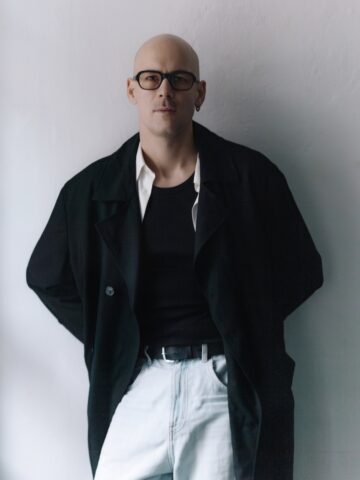
Perfume brand owner David Roelen brings a fresh and uniquely personal perspective to the…
Interview Antonia Mittmann

Photography by Jean Francois Verganti